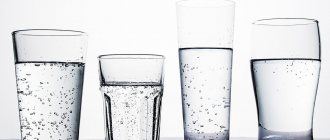- MagniuM
- Articles
- What are the benefits of sparkling water?
|
|
Date of publication: 04/09/2019
Most of us regularly buy carbonated drinks without thinking about their harm or benefit. All over the world, dozens of studies have been devoted to this topic, hundreds of recommendations and authoritative opinions have been developed. How to find out what kind of soda you can drink and how it affects our health.
Man cannot exist without water. Various parts of the human body contain from 75 to 94% water. Lack of fluid immediately affects your health. The rate of daily fluid intake depends on the age and weight of the person. With a weight of about 70 kg per day, up to 2 liters of water are required. An increase in weight to 100 kg leads to an increase in the norm to 3 liters. This amount may include regular drinking and carbonated water.
For many years, debates have continued on the topic of whether carbonated water is harmful, how it affects health, and in what quantities it can be consumed. Researchers and consumers give different opinions, but the majority is inclined to conclude that carbonated water is not only harmless, but also has certain benefits for humans.
The history of sparkling water
There are several versions of the origin of soda, from which the history of this drink begins. The idea is said to have come from watching beer foam. Holding a bottle of water over a container of beer, the observer received the first portion of carbonated liquid.
The official history contains the following facts:
- In 1767, chemist Joseph Priestley from England described the properties of carbon dioxide that could saturate water.
- In 1770, Swedish designer Tober Bergman built a compressor to mix water and carbon dioxide using high pressure. But this method was too expensive for that time.
- In 1883, a patent was issued in the United States for the production of carbonated water, obtained chemically by mixing with soda.
After this, industrial production of soda began. The first manufacturer was Jacob Schweb. Its Schweppes brand is one of the most famous in the world market.
Until now, both methods are used in production - mechanical and chemical.
Is it possible to drink sparkling water while losing weight?
Every person needs to drink a certain amount of water per day. Water quenches thirst and dulls the feeling of hunger. How much water a person needs to drink is calculated individually.
When losing weight, it is useful to start the morning with a glass of warm still water. Water speeds up metabolism, therefore increasing the rate of fat burning. It also helps remove toxins from the body and normalizes the functioning of the gastrointestinal tract, especially during a diet. All this is necessary to maintain health and slimness.
Carbonated water for weight loss can also be consumed every day, but in more moderate quantities. The disadvantages of drinking fizzy drinks include belching, bloating, heaviness in the abdomen, discomfort and flatulence. If this is not a problem, then you can maintain your hydration balance with this water.
Note! Carbonated water for weight loss should not be sweet unless you want to achieve the opposite effect. One glass of sweet soda will ruin all your efforts in the gym and add a ton of calories. In addition, it does not quench the feeling of thirst, but doubles it.
What kind of sparkling water is there?
Various sources are used to produce gas-infused water. This can be ordinary tap water that has undergone additional purification.
But more often, producers take water from local mineral springs, enrich it with carbon dioxide, package it and offer it to the buyer. This product is called carbonated mineral water.
Depending on the source, sparkling mineral water may contain varying amounts of minerals and have a certain level of acidity.
Before deciding whether sparkling mineral water is needed, you need to know its composition.
When choosing, you need to pay attention to the product group. Drinking and table varieties have no more than 1 gram of mineral salts per liter of liquid. Everyone can drink them. Medicinal table water is taken in the presence of certain diseases, specifying why the water is useful for the existing diagnosis. The salt content in it should not exceed 10 grams. If the mineralization of water is more than 10 g per liter, then it belongs to the treatment group. This water is taken according to a doctor’s prescription, since the drink is equivalent to medicine.
Minerals present in the liquid may include sodium, potassium, calcium or magnesium. Thus, a high content of magnesium is present in Magnium water. Usually the composition of the water is indicated on the label.
Manufacturers produce water with different carbon dioxide saturations:
- lightly carbonated - 0.3%;
- medium carbonated - from 0.3 to 0.4%;
- highly carbonated – 0.4% and higher.
The most popular are highly carbonated drinks.
Benefits and harm to the body
Carbonated water, made from regular drinking water, quenches thirst better than plain water in the heat. Carbon dioxide also helps destroy pathogenic microflora.
But besides this, it will not bring more benefits to the body than water without gas. It is exactly the same with daily consumption:
- promotes the removal of waste and toxins, cleansing the liver and blood vessels;
- helps maintain youth (dehydration is one of the main causes of early wrinkles and deterioration of the skin, hair, and nails);
- activates blood circulation (this means a better supply of organs and tissues with oxygen and nutrients);
- stimulates the functioning of the cardiovascular and nervous systems;
- promotes weight loss (as an addition to a balanced diet and reasonable physical activity);
- normalizes appetite;
- helps get rid of constipation.
Real health benefits for problems with the gastrointestinal tract come from medicinal and natural mineral water as part of complex therapy, consumed in strict accordance with the doctor’s instructions.
It normalizes the digestion process and restores the process of normal production of gastric enzymes.
The body is also saturated with useful minerals, which is good for bones and teeth.
Some types of mineral water help increase the level of hemoglobin in the blood and cleanse the walls of blood vessels from cholesterol “plaques”. The latter is an effective prevention of heart attacks.
If you are too enthusiastic (for example, drinking every day) with simple sparkling water, this will not do much harm . The maximum that can be expected is short-term bloating, belching, flatulence, heartburn.
In isolated cases, carbon dioxide, stimulating the secretion of gastric juice, can cause gastritis.
Important! There is research evidence that sparkling water is more effective for those who want to lose weight than regular water. Gas bubbles entering the stomach expand, causing the illusion of fullness and suppressing appetite. But, of course, you can’t live on soda alone.
In the case of mineral water, the consequences are much more serious. Excess minerals (potassium, calcium, magnesium, sodium) in the body:
- provokes salt deposition (as a result – joint problems);
- disrupts the normal water-salt balance (which means disruptions in the functioning of almost all organs);
- causes heartburn, colic, stomach diseases (gastritis, ulcers);
- causes the formation of stones in the kidneys and gall bladder (phosphorus-calcium metabolism is disrupted).
But the worst thing is sweet soda , which children especially love. This drink provokes:
- destruction of bones and teeth;
- obesity;
increase in blood sugar levels and its sharp jumps;- nervous excitability;
- increased blood pressure;
- problems with digestion and absorption of nutrients;
- increased load on the kidneys, liver and excretory system;
- diabetes;
- allergies (can be caused by any chemical).
Difference between sparkling and still water
Manufacturers usually obtain both products from the same source. But with the addition of carbon dioxide, the water takes on some differences.
Carbon dioxide provides:
- additional water purification;
- preservation effect, increasing the freshness period;
- improves taste.
The bottle's label usually indicates the composition of the contents. Code E290 indicates the type of preservative, which is carbon dioxide.
Research on the harms and benefits of sparkling water
Soda consumption is typical for all countries of the world. People drink it most actively in the USA, where up to 180 liters per person per year. The minimum consumption is recorded in China (20 liters). Russia is characterized by moderate consumption - up to 50 liters per year per person. This volume includes all types of carbonated drinks, including sweet and flavored ones.
That's why the most active research on whether sparkling water is healthy is being conducted in the USA and Canada. Observations of control groups of people are designed for decades.
The main conclusions that have been drawn so far indicate that it is harmful to drink sparkling water that contains sugar or synthetic sweeteners. The negative consequences of drinking Coca-Cola are especially noted.
In relation to sugar-free soda, there are no clear conclusions on the question of whether carbonated water is harmful. There is a certain positive effect of its use on various organs and systems of the body.
Effect on the stomach
It is not recommended to drink carbonated water if you have stomach problems and high acidity. It is also noted that if you drink in one gulp, hiccups may begin.
In all other cases, the answer to the question of whether drinking mineral carbonated water is healthy is positive. Soda has a pH balance of 3-4 units, i.e. a slightly acidic environment, safe for the stomach and the digestive system as a whole, except in cases of exacerbation of diseases of the gastrointestinal tract.
When drinking soda, a mild laxative and diuretic effect is observed. Studies were conducted among people complaining of constipation, where two control groups drank carbonated and plain water for 15 days. In the first group, the health status stabilized; drinking water without gas did not affect the state of the digestive system in any way. A particularly positive reaction was observed in the group of older people.
Liquid with carbon dioxide works as a weak diuretic. The benefits of carbonated water cannot be compared with medications in terms of the degree of impact. But women who drink soda in the summer note a decrease in swelling of the legs. At the same time, there is no sudden urge to go to the toilet, as when using diuretic tablets.
Women who are constantly struggling with excess weight are advised to drink a glass of water in the morning on an empty stomach or before meals. In this case, the stomach becomes full, i.e. less food required. Unlike regular liquid, soda slows down the digestion process and keeps you feeling full longer.
In some cases, drinking soda leads to bloating, but this is a short-term phenomenon that ends in a positive result, provoking the release of excess gases from the intestines.
Can I drink soda?
Carbonated water is a drink saturated with carbon dioxide , which forms bubbles in the glass. When deciding whether you can drink it, you need to take into account that it comes in different types:
lightly, medium and highly carbonated;- manufactured by mechanical or chemical aeration;
- based on drinking, natural mineral, medicinal mineral water;
- regular and sweet (using natural ingredients or artificial additives).
Doctors strongly advise reducing the amount of sweet carbonated water consumed to a minimum, and ideally, giving it up completely , and here’s why:
- The drink contains a “shock” dose of sugar (about 30 g per glass). It only increases thirst; it is basically impossible to get drunk with such water.
- The composition includes artificial flavors, preservatives, dyes, and other chemicals harmful to humans.
We can only talk about any benefits if we mean carbonated drinks made with natural herbs and extracts (“Baikal”, “Tarragon”, “Duchess”). But even in high-quality soda, sugar is also present in the composition , reducing their potential usefulness to almost zero.
Mineral water (natural or medicinal) is, in fact, medicine. Therefore, you should never drink it uncontrollably. The daily dosage, regimen and frequency of administration should be determined by a doctor.
Regarding the carbonation method, mechanical is considered safer . With chemical, the required effect is achieved through the fermentation process, the use of acids and baking soda.
But no research has been conducted on this topic, and accordingly, reliable data does not exist.
Drinking water of varying degrees of carbonation will not cause harm to the body in the absence of contraindications.
But it is also recommended to drink it not every day and little by little.
For example, it is admitted that in the heat it quenches thirst better than usual .
Note! If consumed too much, such a drink can cause problems with the stomach and intestines - the higher the degree of carbonation, the faster and more clearly they will manifest themselves.
Effect on bones and teeth
Sometimes you can hear the opinion that drinking soda gradually leaches calcium and bones become more fragile. The basis for this was a study conducted in 2001 in Canada. A group of teenagers who actively drink soda was examined. All had low calcium levels. But in this case we were talking about the influence of sweet carbonated drinks. At the same time, the researchers noted that the teenagers’ diet completely lacked dairy products, from which the body receives calcium in the required quantities.
That is, the results of this experiment cannot be extended to mineral and sparkling water without sugar.
Attempts have been made to test the effect of soda on the condition of tooth enamel. To do this, the extracted teeth were placed in a carbon dioxide environment for a period of 20 minutes to 48 hours. As a result, some destruction of the enamel was observed. But the researchers admit that the experimental conditions are far from real practice, since the soda is in the mouth for several seconds, and in such a short time it does not have time to damage the enamel of the teeth.
Doctors recommend that suspicious patients drink water through a straw. The most noticeable damage to tooth enamel is caused by Coca-Cola, orange juice and coffee. In comparison, the impact of soda is 1 in 100.
Drinking mineral water containing potassium, calcium or magnesium, on the contrary, has a positive effect on the condition of bones, blood and the nervous system.
For example, Magnium water, containing magnesium citrate, is useful for stabilizing blood pressure, normalizing heart function, and protecting bone and muscle tissue.
Mineral water containing calcium can be equated to such healthy products as milk and cottage cheese. In addition, calcium from water is absorbed into the body faster.
Harm of carbonated drinks. Myth or reality?
A bottle of sweet fruity fizz or an ice-cold glass of highly carbonated mineral water - what could be better as an aperitif on a hot summer afternoon? According to statistics, the world leaders in the consumption of such drinks are residents of North America. Literally each of them drinks up to 200 liters of soda per year. Residents of the post-Soviet space are significantly behind the Americans - 50 liters, respectively. It is noteworthy that the total consumption of gas water in the world is constantly growing, thereby causing concern among nutritionists, who note patterns between the development of a number of dangerous chronic diseases and addiction to sugary drinks.
Really, is carbonated water really that harmless? Let's try to understand the basic scientific approaches and assessments of this food product. So let's get started.
Sugary water and obesity
Lemonade, bottled in small 0.33 liter bottles, contains prohibitive sugar content - 12-16 teaspoons, which is three times the permissible daily consumption of this product. Once in the body, soda activates the pancreas, which, by producing insulin, in turn triggers the breakdown of glucose. At this moment, the liver is activated, which converts sugar into the main source of energy for our body - fat.
Due to the fact that most sweet carbonated drinks contain fructose, which, when it enters the blood, disorients the work of the important hormone leptin, which is responsible for controlling fat formation. Therefore, our liver continues to synthesize more and more new fatty structures, which, with uncontrolled consumption of soda, can cause the development of hypertension, obesity, coronary heart disease and diabetes. Moreover, it is enough to drink 0.5-1 liter of gas water daily to gain 1 kg in weight in just a week.
Carbonated drinks are like drugs
One of the components of most sweet carbonated drinks is caffeine. This component can not only raise blood pressure, but is also a fairly powerful stimulant of the central nervous system. Once in the blood, caffeine stimulates the release of the hormone dopamine, which is responsible for feelings of pleasure. The dopamine attack begins 40-45 minutes after drinking a glass of drink and lasts about an hour (until the blood sugar level drops). Thus, people with a sweet tooth develop a mental dependence on foods containing sugar, glucose and fructose. Each new glass of gas water brings with it joy, pleasure, and uplifting mood. Accordingly, the absence of your favorite drink is associated with loss of strength and drowsiness.
A few words about additives
Modern sweet soda is by no means a transparent drink made on the basis of natural ingredients and biological dyes. The base of any sweet gas water is weak phosphoric acid, which, when released into the body’s fluids, gradually washes away calcium, which leads to the development of diseases of the teeth and gums, and also affects the strength of bone structures.
Another constant component of such drinks is the sweetener aspartame (subjectively 200 times sweeter than natural sugar). There is still debate about its impact on the vital systems of the human body in the medical academic environment. However, it has been established that this substance disrupts protein metabolism at the level of cellular structures, which can cause the development of serious pathologies, including epilepsy and cancer.
Synthetic dyes also do not inspire confidence, many of which can cause the development of allergic reactions and asthma.
General conclusions
Based on the above facts and conclusions, it is obvious that regular consumption of sweet carbonated water can indeed cause metabolic disorders, and, consequently, a number of dangerous diseases. Therefore, in order to avoid risks, you should limit your consumption of such liquids to 2-3 glasses per week. In addition, we should not forget that some consumers should refuse this kind of treat altogether. In particular, these include:
- small children under 3 years of age;
- suffering from chronic diseases, including diabetes, obesity, allergies. Drinking sweet water can provoke another attack or worsen the patient’s general condition;
- suffering from gastrointestinal disorders. Sweet water can disrupt the normal functioning of the intestines, disrupt peristalsis, thereby causing problems with stool;
- people controlling or reducing their weight. If you have a sweet tooth, replace soda with water with honey and lemon, natural fruit drinks or compotes.
Mineral sparkling waters
Mineral medicinal or drinking water does not contain sugar or sweeteners, flavor enhancers and dyes, which makes these drinks stand out from the entire gas water niche. Carbon monoxide, used as a natural preservative used to keep water clean and potable, can irritate the stomach lining, thereby stimulating appetite and increasing acidity. Therefore, for people suffering from gastritis, stomach or intestinal ulcers, consuming such water is absolutely unacceptable.
Another important point. To quench thirst and restore the body's water balance, it is best to use drinking mineral water without gas or so-called natural carbonated water. Due to the high level of mineralization and the content of neutral molecules, this drink is able to supply the cellular structures of the body with all the necessary micro and macroelements, including calcium, magnesium, and potassium, which are so necessary for normal metabolism.
It is advisable to use medicinal mineral waters (alkaline, hydrocarbonate and others) as prescribed by your doctor or nutritionist. Otherwise, you may upset the acid-base balance of the stomach, and this is the first step to gastritis and other troubles.









